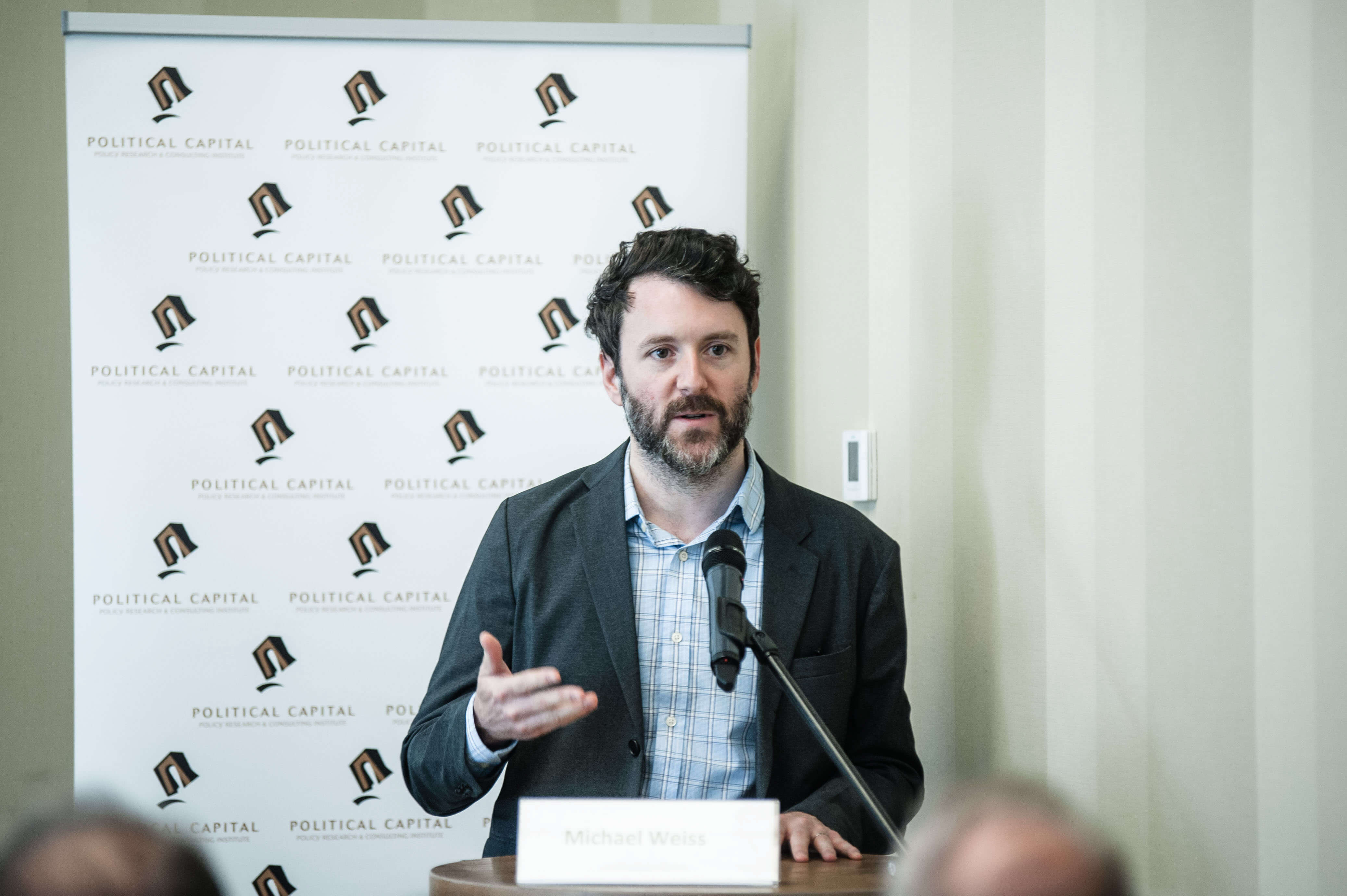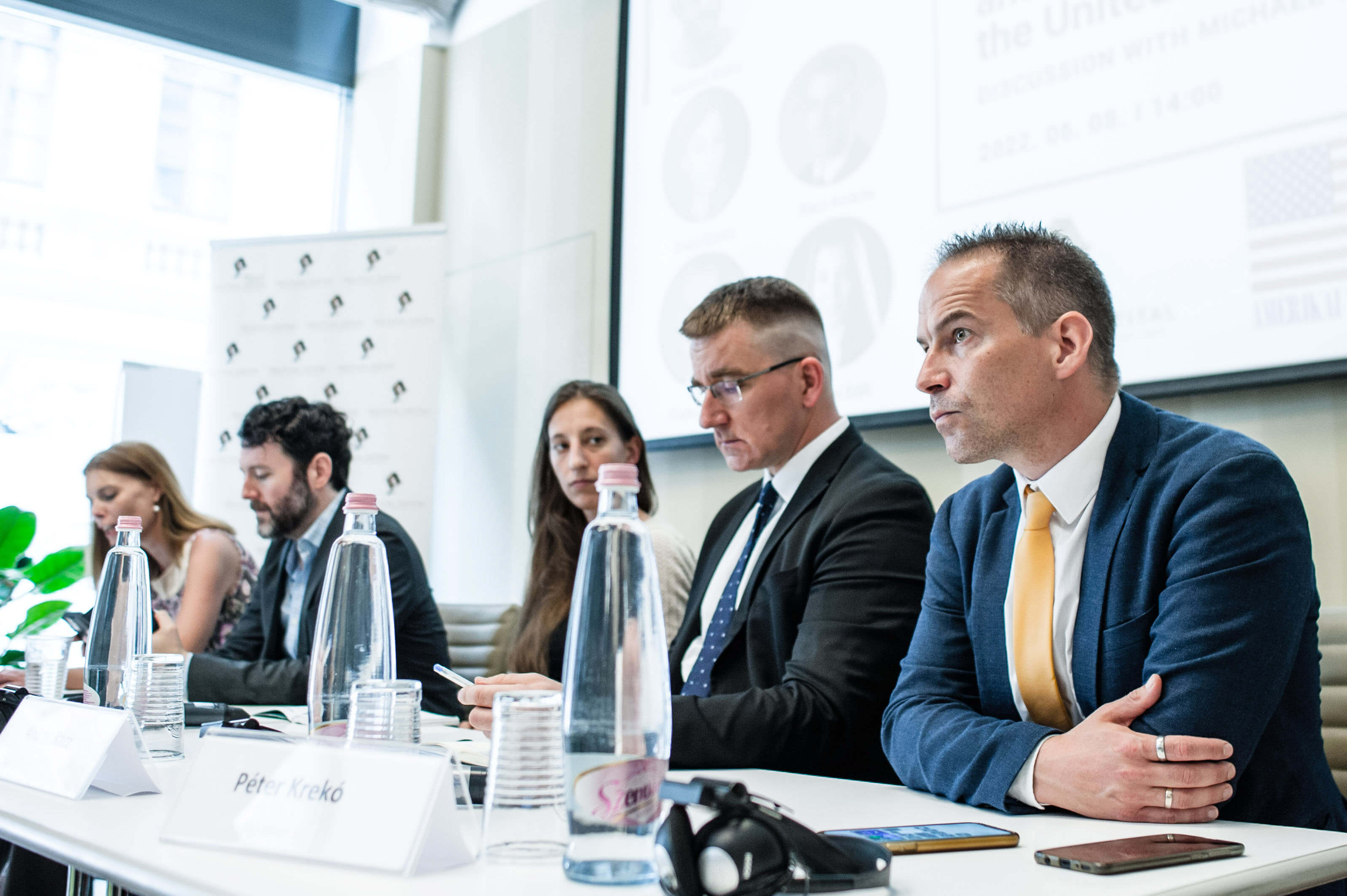The War against Ukraine, disinformation - Discussion with Michael Weiss
On 8 June 2022, Political Capital organized a conference with journalist Michael Weiss, a panel of experts and in partnership with the United States Embassy to discuss disinformation, the war against Ukraine and the image of the United States.
Derek Westfall, Acting Deputy Chief of Mission, US Embassy to Hungary began his introductory remarks with the following: “we live in an age marked by… the inability of people to separate truth from fiction or actual news from conspiracy theories”.
Renowned journalist Michael Weiss emphasized that while Russian disinformation is not a 21st century invention, the use of digital media and social media has allowed disinformation to spread quickly, globally, and with minimal resources. Russia has been waging a campaign of disinformation in an attempt to cloud public opinion concerning their invasion of Ukraine. At the start of the conflict the US media was predicting Kyiv would fall quickly, unintentionally propagating the Russian narrative and propaganda. This “doom” narrative, as Michael Weiss called it, was held onto by the American press for quite a while but Ukraine has defied these expectations. Ukraine has combatted disinformation with their military successes and the cohesion and unity of their civil society and government. Disinformation has become a global phenomenon and currently in the United States the debate on how to address this problem is unfolding. Michael Weiss argued that Ukraine is currently winning the information war and Russia’s campaign of disinformation has had very limited success beyond its borders. On the other hand, the issue of disinformation in the United States is approaching a fever pitch with debates still unfolding about how to address the problem. Ukraine’s cohesion between civil society and their government in combatting disinformation has been extreme.

Michael Weiss was followed by Political Capital analyst, Patrik Szicherle, who presented research on the perception and narratives of the United States and Russia in Hungarian media. In Hungary, the US is depicted almost exclusively in the context of Russia and Ukraine. Public opinion polls show that the majority of Hungarians would choose the US over Russia, but that number is shrinking and dependant on party politics with opposition voters showing stronger support for the US than Fidesz voters. The invasion of Ukraine has altered the media landscape. Anti-US conspiracies are prevalent in mainstream media and pro-Kremlin alternative sites have increased in popularity.
Journalist Blanka Zöldi also spoke to the alteration of the media landscape and said that the war in Ukraine has brought disinformation out of Facebook groups and into mainstream media and even the rhetoric of politicians. Hungary occupied a unique position at the outbreak of the war for several reasons. The government has spent the last 12 years building a friendly relationship with Russia and convincing the public of its benefits. During that time, it has also gradually restricted independent media. The Hungarian election followed the outbreak of war and in this environment misinformation and disinformation flourished. Much like the United States, Blanka Zöldi said that objective truths and facts are debated and often not believed in Hungary.
Journalists Blanka Zöldi and Michael Weiss spoke on the challenges that journalists face in a time of such high levels of disinformation. Online harassment is common and the public’s trust in journalists is extremely low. Blanka Zöldi stated that the current situation can serve as a moment of reflection and re-evaluation of how journalists work and how they can better acknowledge their limitations and communicate their reporting.
The panel of experts discussed the significance of the United States’ role in the war in Ukraine. András Rácz reminded the audience that the US has been gradually increasing their military assistance to Ukraine even prior to 2014 and that the training and expertise provided by the US has made a significant difference. Particularly the intelligence sharing between the US and Ukraine has been integral to Ukraine’s survival and its advances. The coalition of support provided by the United States has surpassed the support of many European states.
Michael Weiss underscored the fact that the United States is sending weapons to Ukraine for two reasons. First, because their prediction that Russia would invade Ukraine was correct and second, because Ukraine is winning and defying expectations. The level of support that the US has committed to Ukraine through sharing intelligence, sending weapons and financial assistance demonstrates that the United States is a player in the conflict and it has set a precedent for the rest of the western world to follow.
Looking into the long-term impacts of the war, András Rácz highlighted how this war has altered the security landscape in Europe. European states have begun to seriously rearm themselves and this year Germany’s defense budget will reach 2% of their GDP. He predicted Europe will continue this process over the next decade. The other striking shift in European security is Sweden and Finland’s application to join NATO without even holding a referendum. Péter Krekó, Director of Political Capital stated that steps toward energy independence will become extremely significant as the conflict unfolds, and that the opportunity is present for Western states to crystalize their alliances.

András Rácz also forecasted that after the fighting in Donbas ends, Russian forces will not have the capabilities to take Kyiv or Odessa and we will see a decrease in fighting. In the aftermath of the war, Russia’s true defeat will be its loss of 30 years of development. Russia is dependant on western technology which it has been isolated from. The war will seriously weaken Russia. Ukraine will have suffered heavy losses and damage but will emerge heavily armed, with a stronger military than Russia which is unable to replace its destroyed and damaged technology. András Rácz predicts that Ukraine’s experienced and heavily armed military will protect it from future Russian aggression after the war for the foreseeable future.
Péter Krekó, Director of Political Capital, warned that when inflation worsens governments and people will likely turn away from Ukraine to focus on domestic issues. It is essential to make it clear that inflation and the economic hardship Europe will face is not because of Ukraine, it is because Russia started a war with Ukraine. All of the panelists stressed the importance of continuing to keep focus on the situation in Ukraine and for the importance of continued financial, humanitarian and military aid from the west.
This summary is written by Robin Martin, student at Munk School of Global Affairs, University of Toronto and intern at Political Capital
To rewatch the panel discussion:

